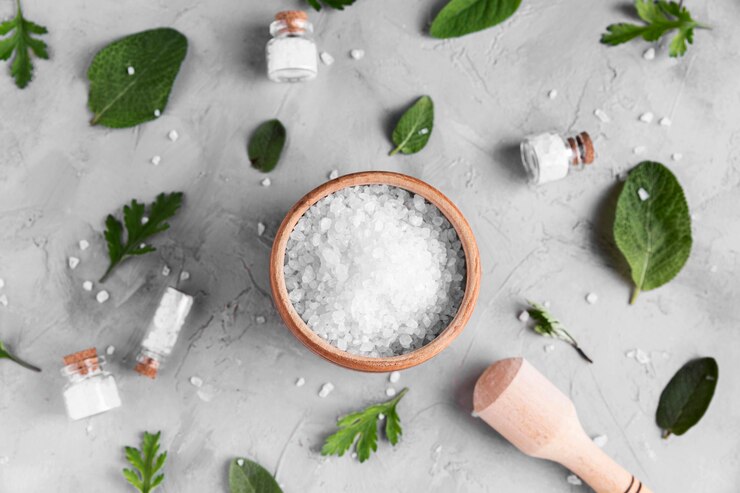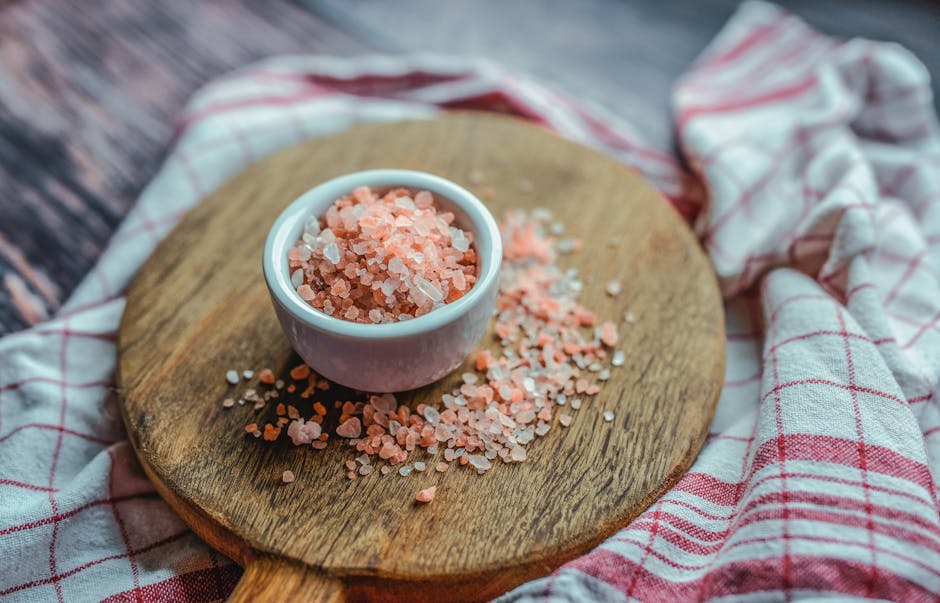आयुर्वेदिक डॉक्टर से प्रश्न पूछें और निःशुल्क या भुगतान मोड में अपनी चिंता की समस्या पर ऑनलाइन परामर्श प्राप्त करें। 2,000 से अधिक अनुभवी डॉक्टर हमारी साइट पर काम करते हैं और आपके प्रश्नों का इंतजार करते हैं और उपयोगकर्ताओं को उनकी स्वास्थ्य समस्याओं को हल करने में प्रतिदिन मदद करते हैं।
Which Salt is Best for Your Health?

Key Takeaways
-
Salt is essential for bodily functions, but not all salt types offer the same health benefits.
- Different salt types, such as table salt and sea salt, have unique properties that can impact well-being.
- Ayurveda provides insights into how various salts affect the body, guiding healthier choices.
- Himalayan pink salt and other alternatives can help reduce sodium intake for better health.
- Selecting the right salt depends on individual dietary needs and preferences, promoting informed health decisions.
Salt is a staple in every kitchen, but not all salts are created equal. With so many salt types for health, understanding which ones are beneficial can feel overwhelming. This article dives into the world of salt types Ayurveda recommends, highlighting which are good for your health. You'll learn about the different options available and explore healthy salt alternatives that might surprise you. From table salt to Himalayan pink salt, each has its story and benefits. By the end, you'll have insights into choosing the right salt for your health journey. Let's sprinkle some knowledge on your plate!

स्वयं दवा न लें और प्रतीक्षा न करें। अभी डॉक्टर से चैट शुरू करें
Exploring Salt Types for Health
When it comes to salt, not all varieties are created equal. In the realm of health, choices abound, each with its own claims and benefits. Table salt, often stripped of minerals, is the most common but not always the healthiest choice. On the flip side, sea salt retains minerals like magnesium and potassium, which can be beneficial for health. Himalayan pink salt, cherished in Ayurveda, is known for its rich mineral content. According to a study, Himalayan salt contains over 80 trace minerals. Such diversity in salt types allows individuals to choose based on health goals. It's fascinating how something as simple as salt can have such varied impacts on our well-being.
Ayurveda’s Take on Salt Types
In Ayurveda, the ancient Indian system of medicine, understanding salt types is key to promoting balance in the body. This practice emphasizes harmony between body, mind, and spirit. Each salt type has unique effects on our doshas, or body energies, which are Vata, Pitta, and Kapha.
Different Salt Types and Their Benefits
-
Rock Salt (Sendha Namak): Known for its cooling properties, rock salt is often recommended for people with a dominant Pitta dosha. It helps to calm and soothe, making it a popular choice during hot weather.
-
Black Salt (Kala Namak): This salt has a distinctive sulfurous flavor and is believed to aid digestion. It's particularly beneficial for Vata dosha as it warms the body and can help alleviate bloating and digestive issues.
-
Sea Salt: Often used in Ayurvedic cooking, sea salt is considered good for all three doshas. It helps enhance the flavor of food while providing essential minerals.
How to Choose the Right Salt
Ayurveda suggests choosing salt based on your body's needs and the season. For instance, in cooler months, warming salts like black salt can be more beneficial. In contrast, rock salt might be better in summer.
Practical Tips for Using Salt in Ayurveda
-
Balance: Use salt in moderation. Too much can increase Kapha, leading to issues like water retention.
-
Quality: Opt for natural and unprocessed salts. They retain more minerals compared to refined table salt.
-
Combination: Mix different salts to balance their effects. For example, combine sea salt with rock salt to achieve a harmonious blend.
By understanding the Ayurvedic perspective on salt, you can make informed choices that support your overall well-being. This ancient wisdom offers a guide to using salt not just as a seasoning, but as a tool for health.

Healthy Salt Alternatives
Choosing the right salt can make a difference in your health journey. Let's explore some healthier options. Himalayan pink salt, for instance, is a popular choice. It's not just pretty to look at—it's packed with over 80 minerals, like magnesium and calcium, which are beneficial for your body. This isn't just a claim; studies have shown that these minerals can support overall well-being.
Sea salt is another alternative. It comes from evaporated seawater and usually retains more natural minerals than regular table salt. That means it can offer some additional nutritional benefits. It’s used in many gourmet dishes for its distinct texture and flavor.
Then there's Celtic salt, often harvested from the coastal regions of France. It's known for its grayish color and moisture content. Fans of Celtic salt appreciate its ability to enhance food taste without overwhelming it.
If you're looking for something less conventional, try black salt, also known as Kala Namak. This salt is often used in Ayurvedic cooking and has a unique sulfurous smell. It's said to aid digestion and is a staple in various traditional recipes.
Each salt has its own set of potential health benefits. Choosing the right one can depend on your personal health goals and taste preferences. Consider experimenting with these alternatives to see which one suits your lifestyle best.
Making the Right Choice for You
Choosing the right salt for your health can feel like a tricky task. We've explored various salt types, each with its own benefits and uses. From traditional table salt to the ancient wisdom of Ayurveda, there's a lot to consider. Some salts offer essential minerals, while others are known for their culinary appeal.
Think about what matters most to you. Are you focused on boosting your mineral intake? Maybe you're drawn to the holistic benefits of Ayurvedic salt types. Remember, your health priorities and taste preferences will guide your decision.
Now that you have a better understanding, why not share your thoughts? We'd love to hear about your experiences or any salt tips you might have. Drop a comment or share this article with someone who might find it helpful. Exploring more about salt and health could lead you to exciting discoveries. Keep curious, and see what works best for you!
FAQ For Salt
What is the role of salt in our diet?
Salt is crucial for maintaining fluid balance, nerve function, and muscle contraction. However, excessive consumption can lead to health issues like hypertension. Understanding the right amount needed for your body is key.
How does table salt differ from sea salt?
Table salt is heavily processed and often contains additives to prevent clumping. Sea salt is less processed, retains trace minerals, and can have a coarser texture. Both contain sodium, but the mineral content differs.
What does Ayurveda suggest about salt consumption?
Ayurveda categorizes salt as a heating element that can balance certain body types while aggravating others. It suggests using salt mindfully and recommends rock salt for its purity and mineral content.
Are there healthier salt alternatives that reduce sodium intake?
Yes, Himalayan pink salt and potassium salt are popular alternatives. They contain additional minerals and less sodium than regular table salt, potentially offering a healthier option without sacrificing flavor.
Is Himalayan pink salt truly better for health?
Himalayan pink salt contains trace minerals like calcium, magnesium, and potassium, which can be beneficial. However, its health superiority is often overstated, and it should still be consumed in moderation.
Can using different types of salt impact my health significantly?
The impact depends on the quantity and frequency of consumption. While switching to a salt with more minerals can be beneficial, the overall health impact is largely determined by your overall diet and lifestyle choices.
How do I choose the best salt for my dietary needs?
Consider your health goals, such as reducing sodium intake or increasing mineral consumption. Consult with a healthcare provider if you have specific health conditions, and choose a salt type that aligns with your lifestyle and dietary preferences.

